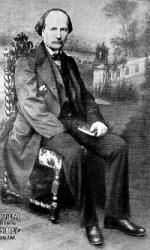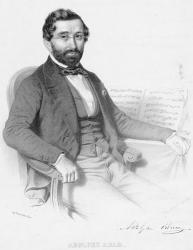Planning worship?
Check out our sister site, ZeteoSearch.org,
for 20+ additional resources related to your search.
- |
User Links
Person Results
Placide Cappeau

1808 - 1877 Author of "Cantique De Noël" in The Cyber Hymnal Placide Cappeau France 1808-1877. Born at 8 p.m. On 10/25/1808, the son of a cooper. He may have followed in his father's business, but when eight years old, a playmate accidentally shot him in the hand with a gun he was playing with, and the hand had to be amputated. He followed an academic career instead. The shooter's father paid for half his education, and he was able to attend town school and the College Royal d'Avignon. Despite his handicap, he was awarded a first prize in drawing there. He studied literature in Nimes, and law in Paris, and was licensed to practice law in 1831. Instead, he became a merchant of wines and spirits, but his focus was really on literature. A parish priest, Father Petitjean, in Cappeau's community, asked him to write a Christmas poem to celebrate the renovation of their organ, and he agreed to do it, despite being an avowed atheist and vocal anti-cleric. He researched the book of Luke and wrote the hyrics to “O Holy night”. An opera singer, Emily Laurie, saw the text and asked a Jewish friend of hers to compose music for it, which he, remarkably, did. She sung it at a midnight mass three weeks later, and parishoners raved, but when Catholic church leaders found out it was written by an atheist, they banned it. However, its popularity only grew. Cappeau authored 5 works, the last published in 1876. He was mayor of the town, Roquemaure, and he died there.
A side story: In 1906 Reginald Fessenden, a 33 year-old university professor and former chief chemist for Thomas Edison, did something thought impossible. Using a new type of generator, he spoke into a microphone and for the first time in history a voice was broadcast over the airwaves. And he read, from the book of Luke, “And it came to pass in those days, that a decree went out from Ceasar Augustus that all the world should be taxed.” He began, in a clear strong voice. Shocked radio operators on ships and wireless owners at newspapers, used to Morse code heard over tiny speakers, were interrupted by a speaking voice reading Luke and had no idea where it came from. When the professor finished his reading, he picked up his violin and played “O Holy Night”.. the first song ever played over the air waves in the whole world. Imagine the surprise of listeners everywhere, never suspecting such a thing was possible.
John Perry
Placide Cappeau
Adolphe Adam

1803 - 1856 Composer of "[Minuit, chrétiens, c’est l’heure solennelle]" in The Cyber Hymnal Adolph Charles Adam, born at Paris, 1803; entered the conservatory, 1817; composed several operas; went to London 1832, but soon returned to Paris, where he died, May 2, 1856, aged 53. His remans wer followed to the grave by three thousand persons; and at his death he left some music and his memoirs for publication. He was a very active composer; and among his operas are "Richard Coeur de Lion," "Le Postillon de Lonjumeau," "La Chalet," and many other popular operas.
A Dictionary of Musical Information by John W. Moore, Boston: Oliver, Ditson & Company, 1876
Adolphe Adam
Marie Copeau
Author of "Minuit, Chretiens, c'est l'heure colennelle" in Chants Sacres. Deuxieme serie
Marie Copeau


 My Starred Hymns
My Starred Hymns

